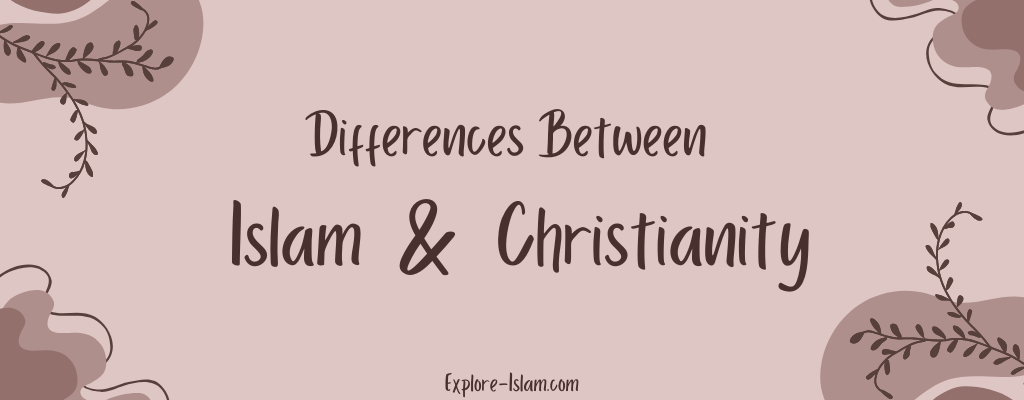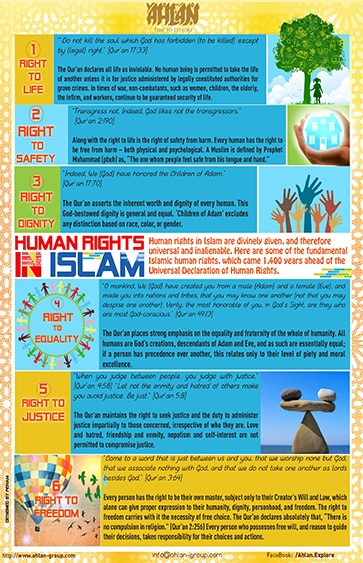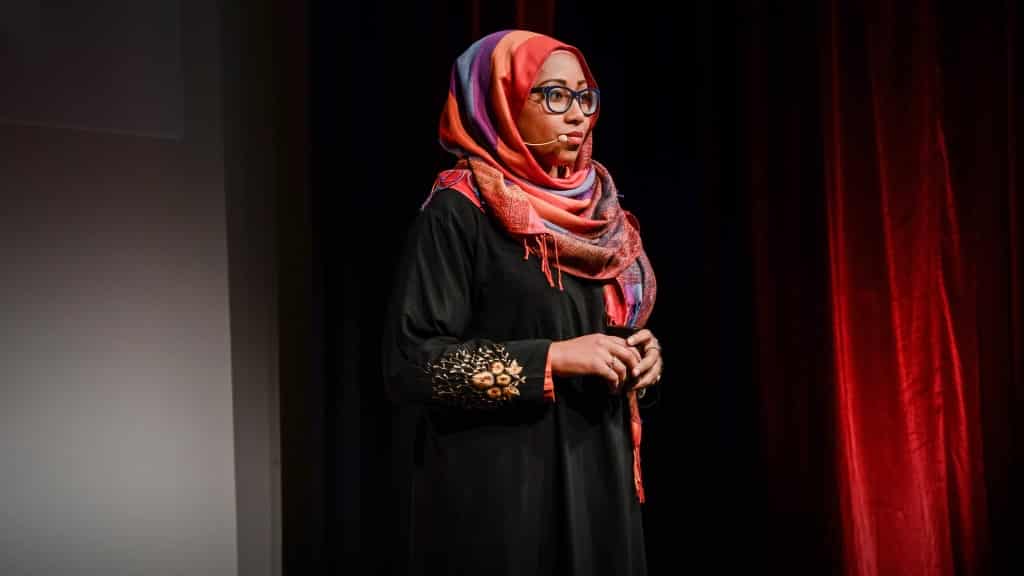Do you believe there are differences between Islam and Christianity? What about the similarities? If you’ve been searching for the truth, you’re in the right place! This guide uncovers the key similarities between Islam and Christianity, demonstrating how Muslims regard Jesus and the original Bible as essential pillars of their faith. It also delves into the roots of the differences between the two religions by examining their principles, history, and selection of texts. This guide will help researchers and truth seekers broaden their perspective on their journey. May this reflective journey lead you to ultimate truth and eternal happiness!
Differences Between Islam And Christianity
Since the Bible was addressed to a specific people at a specific time, its original content has been lost and distorted over time. Thus, one can observe differences between the core instructions of Jesus, which align with Islamic teachings, and those of the Church. Below are some significant differences between Islam and Christianity:
1. Different Preservation Methods in Islam and Christianity
Almighty God promises to save the Quran as the last divine message to humanity, while Almighty God left the task of preserving the Bible to its people. The result is that the Quran has maintained a highly authentic and consistent state. However, the Bible faces challenges stemming from lost original texts, unknown authors, and discrepancies in its transmission.
What is the System of Islamic Scripture Preservation?
The Quran is the direct and final word of God, revealed to Prophet Muhammad through the Angel Jibriel over 23 years and promised to be preserved:
“We have, without doubt, sent down the Message; and We will assuredly Guard it (from corruption).”
Its preservation combines oral transmission as the main method, keeping written manuscripts as a secondary one.
- Continuous Chain of Oral Transmission for Same Text: From the outset, Prophet Muhammad’s companions memorized the Quran, a tradition upheld by millions of Muslims (Hafiz) across generations through a continuous chain of memorizers till today.
- Written Scriptures by Trusted Scribes: Using writing as a secondary tool of preservation, Muslims documented the revelations during the Prophet’s lifetime, forming the foundation for the Uthmani script, which remains the standard text of the Quran for Muslims till today.
Thus, this rigorous process serves as a part of the divine safeguard against alteration, ensuring the Quran’s purity and authenticity throughout history.
Was the Christian Scripture Preserved?
In contrast to the Quran, the Bible faces significant challenges in its transmission, stemming from the loss of the original text, unknown authors, and various discrepancies in its preservation:
- The Loss of Original Texts: The original texts of the Bible are lost, including the “Q source,” which scholars believe predates the Gospels. “Over the course of the first century, people living under desperate circumstances appended different layers of text to Q.” (Burton Mack: The Lost Gospel)
- Unknown Authors: The authors of the Gospels remain unknown, with many texts attributed to prominent figures for credibility. As mentioned by Christians themselves: “The Gospel of John is not merely the testimony of an eyewitness recorded all at once on the day following the events, but everything suggests otherwise.” (The Bible, A to Z, translated by the Jesuit Fathers)
- Language of Transmission: The Gospels were written decades after Jesus’s time in Greek, not the Aramaic language he spoke.
- Contradictions and Variations: Contradictions and variations between manuscripts, translations, and human alterations, as noted in Jeremiah 8:8: “The false pen of the scribes has made it into a lie,” highlight instances where scribes modified the text.
The Bible’s authorship reveals significant uncertainties, with books revealed through dreams, visions, or direct communication from God to prophets, and some based on historical accounts or personal reflections. The Gospels were written by different individuals, with scholars suggesting they were written in the second century. These texts were later attributed to famous figures for approval.
2. Different Monotheism: Do Islam and Christianity Believe in the Same God?
The original teachings of Prophet Jesus about the Almighty One God align with Islamic teachings, as both came from the same divine source. However, over time, human interventions and distortions have altered these core beliefs, blending them with pagan ideas. This led to misunderstandings and practices that diverged from the original monotheistic message, as seen in the following ways:
Early Teachings of Prophet Jesus about God Match Islamic Belief
The early teachings of Prophet Jesus, as scattered in the Bible, emphasize unipersonal monotheism, similar to Islamic beliefs. For example, Prophet Jesus states: “The Lord our God, the Lord is one,” and he never asks for worship. Instead, he worshipped God and prayed to Him.
The Distortion of Uni-Personal Monotheism in Christianity
Over time, the Church altered this original truth by introducing the sophisticated concept of a tri-personal God—three persons but one essence simultaneously. This innovation diverged from the early Christian belief in the Oneness of God.
How & When Belief in One God Changed in Christianity
The American Encyclopedia highlights the original belief in one God in early Christianity, which was later distorted:
The belief in the Oneness of God – as a theological movement – began at a very early stage in history, and in fact, it preceded the belief in the Trinity by many decades. Christianity developed from Judaism, and Judaism firmly believes that there is one God. The path from Jerusalem (the home of Christ’s first disciples) to Nicea (where it was decided in 325 CE that Christ was equal to God in essence and eternal nature) was far from straightforward.
How Idolatry Entered Christianity
An American writer described how idolatry and polytheism infiltrated Christianity:
“Idolatry and polytheism entered Christianity through the influence of the hypocrites who occupied positions of influence and high positions in the Roman state by pretending to be Christians, but they never cared about religion.”
Thus, the concept of monotheism in Christianity changed over time, shifting from a belief in a uni-personal God to a tri-personal god. This change was introduced as an attempt to address and justify the fabricated notion of the Trinity, which borrowed elements from human-made beliefs, ultimately promoting a tritheistic idea that was not part of the original message of Prophet Jesus.
3. Different Attributes of Almighty God
The attributes of the Almighty One God differ significantly between Islam and Christianity. Let’s compare verses from the Quran and the Bible:
Attributes of God in Islam
In Islam, God is one, eternal, all-powerful, and beyond human understanding. The Quran highlights His perfection. For example:
- God’s Creation and Power:
“And verily We created the heavens and the earth, and all that is between them in six periods, and no fatigue touched Us.” (Quran 50:38) - God’s Uniqueness:
“There is nothing like Him. He is the Hearing, the Seeing.” (Quran 42:11)
Attributes of God in Christianity
In contrast, the Bible attributes human-like qualities to God, reflecting distortions in its portrayal:
- God’s Rest After Creation:
“By the seventh day, God had finished the work He had been doing, so on the seventh day He rested…” (Genesis 2:2) - God’s Regret and Repentance:
“It repented me that I have set up Saul to be king.” (1 Samuel 15:11) - God’s Anger and Intervention:
“Then the Lord awoke as from sleep.” (Psalms 78:65)
These verses depict God with qualities like fatigue, regret, and anger, contrasting with the Islamic view of God’s perfection.
4. Different Scope: Temporary Christianity vs. Universal Islam
The message of Prophet Jesus was limited to his nation. As he said, “I have not been sent but to the lost sheep of Israel” (Matthew 15:24). This is because there would be another Prophet with the final message to all humanity to come.
In contrast, Islam’s message is universal, meant for all of humanity as the final divine revelation on Earth. Almighty God says in the Quran:
“We have sent you ˹O Prophet˺ only as a mercy for the whole world”
(Quran 21:107).
5. Salvation and Original Sin: Meaning in Islam & Christianity
The concept of salvation differs significantly between Islam and Christianity. In Islam, salvation is based on individual accountability and justice motivating the person for true reformation and self-descipline. However, in Christianity, salvation is understood as a common burden carried by Jesus (Peace be upon him) as an atonement for humanity’s sins resulting in equality between good and bad individuals.
Salvation in Islam
In Islam, everyone is born innocent, and individuals accumulate good or bad deeds throughout their lives. Salvation is determined by the balance of deeds, with good deeds outweighing the bad. The Quran states:
“No soul burdened with sin will bear the burden of another”
This rational idea of Islamic salvation motivates humans to exert effort in reforming themselves and therefore positively affects the whole society. From a common-sense perspective, we cannot accept equality between hard workers and careless individuals.
Salvation in Christianity
In contrast, Christianity teaches that the original sin of Adam and Eve, eating from the Forbidden Tree, led to a fallen human nature. Christian belief holds that God sent His son, Jesus (Peace be upon him), as the perfect sacrifice to atone for humanity’s sins.
The bible states self-accountability as a principle contradicting the christian salvation:
“Parents are not to be put to death for their children, nor children put to death for their parents; each will die for their own sin.”
Salvation According to Jesus Matches Islamic Belief
The true meaning of salvation, according to Jesus (PBUH), is through adherence to the commandments of Almighty God. As stated in Matthew 19:16-17, Jesus (PBUH) emphasized following God’s law to attain salvation. This proves that the commonly held Christian view of salvation has deviated over time.
To know more about original sin and salvation, read these articles:
- Did Jesus Die for Our Sins? – The True Meaning of Original Sin
- The Original Sin In Islam – Who Sinned First?
- Does Allah Forgive All Sins? – I Have Sinned!
6. Different Beliefs About Jesus in Islam & Christianity
Islam and Christianity hold distinct beliefs about Prophet Jesus. Following is the summary of each belief:
Islamic Belief About Jesus
- Human Nature of Jesus: Islam asserts Jesus’ human nature as one of the top five noble prophets to humanity.
- Miraculous Birth: His mother, Mary, is regarded as a noble virgin chosen by Almighty God to be one of the best women in history, giving birth miraculously to the great Prophet Jesus.
- Jesus Did Not Die for Human Sins: Instead, Almighty God saved him and raised him to heaven.
- Jesus’ Return: By the end of the world, Jesus will return to refute the false ideas of the cross and the Trinity and fight the Anti-Christ.
- Testifying Against False Allegations: Jesus will testify against those who allege divinity for him.
Christian Belief About Jesus
Most Christians believe that Jesus is God or the Son of God, although he did not ask for worship or declare divinity in the Bible. Additionally, the title “Son of God” is given to many others in the Bible, such as King David and Solomon, suggesting that the term “son” metaphorically refers to a righteous person.
Is the belief in Jesus’ crucifixion compatible with Christianity?
While the common belief of Christians is that Jesus was crucified for human sins, the Gospel records suggest something else. For example, according to Matthew:
“‘He (God) will command his angels concerning you, and they will lift you up in their hands, so that you will not strike your foot against a stone.’”
Indeed, the truth of Jesus being raised up is compatible with justice and rationality.
7. Prophets’ Descriptions in Islam vs. Christianity
In Christianity, the Bible attributes improper actions to certain Prophets, such as Lot committing incest (Genesis 19:30-37), Solomon worshiping idols (1 Kings 11:3-5), and Noah becoming drunk and lying naked (Genesis 9:20-21). In contrast, Islam portrays Prophets in the Quran as paragons of morality, faith, and piety, honoring them with high virtues—for instance, Noah is praised (Quran 37:79), Abraham is described as kind and penitent (Quran 11:75), and Lot is commended for his wisdom and righteousness (Quran 21:74).
8. Level of Rationality in Islam and Christianity
One primary difference between divine messages and human ones is their ability to transcend the time of their appearance. While the Gospels are human works, they are deeply influenced by their time and often contradict reason and science. In contrast, the Islamic message, preserved by Almighty God for all humanity, contains miraculous facts that confirm its divine origin.
Role of Rationality in Islam
Do you know that there are more than 10 instances in the Quran directly asking for the use of reason, while there are even more indirect references? The following explains how Islam considers reason:
- Elevation of Reason: Islam elevates human reason, urging Muslims to reflect and use their intellect in its rightful domain, i.e., the tangible world and related matters.
- Harmony of Reason and Revelation: Islam asserts that there is no contradiction between authentic Islamic traditions and sound reasoning.
- Systematic Application of Reason: Islam encourages the scientific and systematic use of reason through “ijtihad” to address contemporary issues. This is governed by rules studied in the sciences of Usul al-Fiqh (principles of Islamic jurisprudence) and Uloom al-Hadith (sciences of prophetic traditions).
- Flexibility in Practice: Islam exempts individuals from adhering to rules when they face extreme hardship, based on the principle of necessity.
Level of Rationality in Christianity
Do you think being a committed Christian while considering rationality is applicable? Let’s explore:
- Irrational Creed: The core belief in distorted Christianity revolves around the concept of the Trinity, which presents the idea of “three but one”—a mystery that remains unresolved and incomprehensible. Even common Christians are not allowed to question or argue about it.
- Unscientific Teachings: Scientific facts are often disregarded in the Gospels. For instance, claims like the earth being flat and fixed contradict basic scientific knowledge.
- Impractical Moral Advice: The Bible suggests moral principles that are irrational and impractical, such as:
- “Do not plan for the future” (Matthew 6:34).
- “Sell everything and give it to the poor” (Luke 12:33).
- “Do not have sexual urges” (Matthew 5:28).
- “Do not work to obtain food” (John 6:27).
Thus, Islam regards reason as a vital tool, encouraging believers to reflect on creation, ponder over Quranic verses, and seek deeper understanding. Rational thinking is not only allowed but actively encouraged within the boundaries set by divine wisdom. In contrast, Christianity considers reason a threat to its existence!
9. Meaning of Worship in Islam & Christianity: Which is comprehensive?
Is it suitable for worship to be restricted to places, times or specific persons? Let’s explore how worship is significantly different in Islam from Christianity:
Worship in Islam includes all life aspects
In Islam, worship encompasses every aspect of life, making it a comprehensive concept. It includes any inward or outward action that pleases Almighty God. Worship in Islam is not restricted to specific places, such as masjids. Instead, Islam provides a holistic system that guides Muslims in all areas of life. This system covers:
- Worshiping one God and praying to Him.
- Inner feelings such as love, fear, and trust in Almighty God.
- Intending to do good deeds, even if the action is not carried out, which still earns rewards.
- Guidance on governing societies and managing finances.
- Following specific manners in daily activities, such as:
- Eating and drinking.
- Smiling and showing kindness.
- Taking showers.
- Going to the bathroom while adhering to recommended etiquettes.
By following these guidelines, Muslims can transform everyday actions into opportunities to gain extra rewards.
Here, it’s important to note that the comprehensive system of Islam is based on authentic traditions and should not be judged by the actions of Muslims, as they, like all humans, make mistakes and have shortcomings.
System of Worship in Christianity
In contrast, worship in Christianity is primarily limited to general concepts, such as loving God and believing in salvation. It often involves attending Sunday ceremonies and praying in church. This approach can leave a spiritual gap and allow secular influences to dominate other aspects of life.
10. Marriage in Islam vs. Christianity: Which is practical & healthy?
Marriage is a necessity for the legitimate coming of generations. Here is how it’s considered in Islam and Christianity:
Marriage System in Islam
Marriage in Islam is described as a “heavy pact” but in a practical and healthy manner. Key principles include:
- Allowing divorce as a last resort, giving both men and women the right to start anew with another partner if continuing the marriage becomes impossible.
- Assigning men the responsibility of financially supporting their wives and children.
These measures help maintain stability in Muslim families, preventing the societal deterioration often seen in other systems.
Marriage in Christianity and Its Results
Marriage rules in Christian churches vary: the Orthodox Church views marriage as an eternal union before God, while the Catholic Church forbids divorce and considers couples bound for life, even after civil divorce. Protestant churches differ, with some permitting divorce and remarriage, while others allow divorce only in specific cases and forbid remarriage entirely. The result is:
- The rise of illegitimate relationships if the marriage fails or proves insufficient.
- Increased rates of abortion and children with unknown fathers, contributing to broken families and social crises.
- Declining marriage rates due to restrictive policies.
For instance, in 2022, 42.2% of live births in the EU were outside of marriage, according to a study.
For more about marriage in Islam, refer to the following articles:
- Marriage in Islam – Full Guide to Rights and Duties
- Love In Islam! – Benefits of Love And Marriage In Islam
- Interfaith marriage in Islam
11. Existence and Role of Religious Men
In Christianity, religious men act as intermediaries between humans and God, serving as essential figures for confessing sins and seeking forgiveness. In Islam, there is no concept of intermediaries; any qualified Muslim—whether a professor, scientist, or designer—can learn and specialize in Islamic knowledge. Additionally, any Muslim who masters Quranic recitation with sound knowledge can lead prayers. Repentance in Islam is a direct and sincere act between the individual and Almighty God, without the need to confess sins to anyone.
12. What Is Different About How Christianity And Islam Spread?
The main difference between the spread of Christianity and Islam lies in their methods and motivations. Christianity’s expansion often relied on political coercion and military campaigns, such as the Crusades, which sought to unify territories under the guise of religion.
In contrast, Islam emphasized peaceful propagation, with the Qur’an advocating freedom of belief and justice:
“Let there be no compulsion in religion”
[2:256].
Historical accounts highlight Islam’s growth in regions like Southeast Asia through trade, dialogue, and moral teachings rather than conquest. Even when jihad (Islamic opening) happened, it was for fighting the stubborn governments refusing to allow Muslims from spreading the message of Islam safely, and fighting was restricted to warriors keeping the resources for its people and inviting them to faith with wisdom and compassion.
13. History: How was the development of Islam similar to or different from Christianity?
There is a significant difference between the development of Islam and Christianity due to the different contexts of each case as follows:
How Islam developed
Islam is the final divine message, preserved by Almighty God through:
- Preservation of Islamic noble book, the Quran, and the authentic teachings (Hadith).
- Restricted rules: Ensure the message remains unchanged, with strict rules and systems in place to prevent alteration known in the sciences of Usool al-fiqh and Uloom al-hadith.
- Accepted ijtihad: While the core message is protected, Islamic law (Sharia) allows for Ijtihad (independent reasoning) in modern issues based on the established principles of Usul al-Fiqh.
How Christianity developed
Unlike the Quran, the responsibility of preserving the Bible was entrusted to its followers. Since Christianity was a temporary message, it was superseded by Islam. Following are the key events affecting development:
- The Lost Original Bible: After Jesus’ ascension to heaven, his disciples faced persecution and didn’t document a book.
- Paul’s Role in Christianity’s Development: Paul, a jew pretended to embrace Christianity, deviated from Jesus’ emphasis on adhering to the divine Law. Paul disregarded the Law in his epistles, such as Romans 3:28 where he claimed that justification comes by faith apart from the works of the Law. This marked a significant shift from Jesus’ teachings, altering the foundational principles of the Bible.
- Questioned Documentation of the Gospels: The authors of the four Gospels were not direct witnesses to Jesus’ life, and in languages that differed from the original Hebrew, leading to distortions and variations in the message.
- Scattered Truths in the Bible: Despite distortions, the Bible still contains remnants of truth, preserved by God’s Will. These fragments of truth serve as guidance for those seeking knowledge and ultimately point toward the coming of Islam as the final, divine religion.
14. Age: How Old is Islam and Christianity?
There are two aspects to make a suitable answer for the comparison between the age of Islam and Christianity:
- Islam as a Timeless Message: Islam, in its essence as the divine message of Almighty God delivered to all Prophets and Messengers with the same core and different legislations, is older than Christianity. The core teachings of Islam, delivered to all of God’s messengers, began with Prophet Adam. In this sense, Islam predates Christianity, as the same message was conveyed by all prophets throughout history.
- Islam as the Final Revelation: If referring to Islam as the final, divine revelation sent to humanity through Prophet Muhammad (PBUH), then Christianity is older. The first revelation to Prophet Muhammad (PBUH) occurred in 610 AC, which is centuries after the emergence of Christianity.
Read also: Is Islam The Message of All Prophets?
15. Growth Rate of Islam VS Christianity
Pew research shows that Islam is the fastest-growing religion in the world. While Christianity is currently the world’s largest religion. Muslims will make up 30 percent of the world’s population by 2050, compared to around 25.8 percent of the population in 2024.
Do you want to know why Islam is the fastest-growing religion? Read these articles:
- The Spread of Islam With Timeline and Map!
- Why is Islam the Fastest-growing Religion?
- 8 Reasons Why You Should Be a Muslim?
Similarity Between Islam and Christianity:
Islam and Christianity share several foundational beliefs rooted in divine origin, particularly the worship of one God and reverence for Jesus (PBUH). Both religions emphasize monotheism, with the Bible and Quran affirming God’s oneness.
While Islam sees the original Bible as partially distorted over time, it recognizes its divine origin and calls Christians “People of the Book,” urging common ground. Muslims also honor Jesus as a prophet, following many of his teachings such as prayer, dietary laws, peace greetings, and circumcision.
Additionally, both scriptures contain prophecies pointing to the coming of Prophet Muhammad (PBUH). The Quran states that his description appears in the Torah and Gospel, while the Bible includes references like Deuteronomy 18:18 and the Paraclete prophecy in John 14:16, which some scholars link to Muhammad.
These parallels show that Islam preserves the essence of Jesus’ message and continues the spiritual path rooted in earlier revelations, fostering mutual respect and shared values between the two faiths.
Conclusion:
To conclude, this article explores the main differences between Islam and Christianity, building the comparison on the following aspects and offering readers the opportunity to make an informed decision based on rational research. Prior to this, the article highlights the similarities between Islam and Christianity, referencing the scattered truths found in the Bible. It asserts that Islam is the message of all prophets, including Jesus (PBUH), and that it was finalized by Prophet Muhammad, abrogating previous versions.
The article also examines the reasons behind the significant differences between the final versions of the two religions, attributing these differences to factors such as the lack of preservation and alterations. The following are the main points discussed in the article:
- Documentation: The system of documentation for the holy books of both religions and the effect of the divine promise in preserving the Quran.
- Monotheism: The meaning of monotheism, the introduction of the concept of the Trinity into Christianity, and how it contradicts the early teachings of Jesus (PBUH).
- Salvation: The meaning of salvation and original sin, emphasizing the importance of justice based on biblical accounts and common sense.
- Jesus & Prophets (PBUT): The differing beliefs about Jesus (PBUH) and other Prophets between Islam and Christianity, illustrate that Muslims honor Jesus, follow him and elevate him more than others.
- Rationality: The level of rationality in both religions by analyzing certain rules and texts.
- Marriage: The marriage systems in Islam and Christianity, and the effects of each approach.
- Religious men& intercession: The role and limits of religious leaders in Christianity and the absence of a need for intercession in Islam.
- Worship range: The differing range and meaning of worship, with Islam expanding it to every aspect of life, offering opportunities for additional rewards and rational spirituality.
- Key facts about the development, age, and history of the two religions.
Finally, the article concludes by exploring the growth rates of Islam and Christianity with research proving that Islam is the fastest-growing religion, giving readers time to analyze the reasons behind these results and reach an informed conclusion. Feel free to send any questions at any time. May Almighty God help your heart to reach the ultimate truth!
















